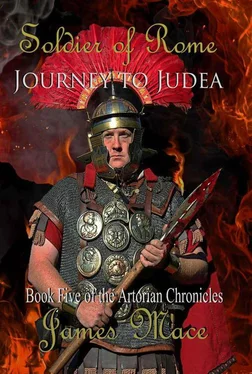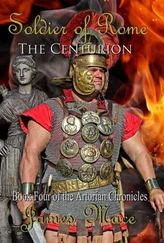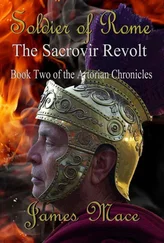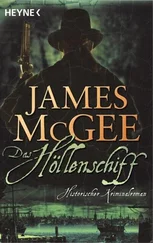James Mace - Soldier of Rome - Journey to Judea
Здесь есть возможность читать онлайн «James Mace - Soldier of Rome - Journey to Judea» весь текст электронной книги совершенно бесплатно (целиком полную версию без сокращений). В некоторых случаях можно слушать аудио, скачать через торрент в формате fb2 и присутствует краткое содержание. Жанр: Исторические приключения, на английском языке. Описание произведения, (предисловие) а так же отзывы посетителей доступны на портале библиотеки ЛибКат.
- Название:Soldier of Rome: Journey to Judea
- Автор:
- Жанр:
- Год:неизвестен
- ISBN:нет данных
- Рейтинг книги:5 / 5. Голосов: 1
-
Избранное:Добавить в избранное
- Отзывы:
-
Ваша оценка:
- 100
- 1
- 2
- 3
- 4
- 5
Soldier of Rome: Journey to Judea: краткое содержание, описание и аннотация
Предлагаем к чтению аннотацию, описание, краткое содержание или предисловие (зависит от того, что написал сам автор книги «Soldier of Rome: Journey to Judea»). Если вы не нашли необходимую информацию о книге — напишите в комментариях, мы постараемся отыскать её.
Soldier of Rome: Journey to Judea — читать онлайн бесплатно полную книгу (весь текст) целиком
Ниже представлен текст книги, разбитый по страницам. Система сохранения места последней прочитанной страницы, позволяет с удобством читать онлайн бесплатно книгу «Soldier of Rome: Journey to Judea», без необходимости каждый раз заново искать на чём Вы остановились. Поставьте закладку, и сможете в любой момент перейти на страницу, на которой закончили чтение.
Интервал:
Закладка:
“I think he’s dead, sir!” the legionary responded.
The earth heaved beneath them and the man suddenly panicked.
With a growl of rage, Justus grabbed the other legionary’s heavy spear, which he had since left at the base of the cross. He looked up at Jesus, and he did, indeed, look as if he were already dead. Still, he had to make certain. He swallowed hard and gritted his teeth.
“Please forgive me,” he said quietly. He then thrust the spear just beneath the Nazarene’s ribcage. The weapon plunged into the man’s flesh, penetrating all the way to the heart. As he wrenched free the crimson-soaked blade, a jet of blood and fluids splashed him in the face. He gave a great cry and fell to his knees as if he had been struck down, his helmet knocked from his head.
After a moment the rumble of the earth subsided, though the sky remained black. Justus glanced around and realized he was alone. Shivering despite the warmth in the air, he donned his helmet and gazed down at the bloodied spear. He clutched the weapon close and looked up at the cross once more. Without another word he solemnly walked away.
It was a long walk back to the barracks and the principia. Artorius had ordered Cornelius and Julius to keep him posted on the disposition of the crowds. There had been a brief panic following the tremors, and with the sky still dark it seemed that most of the people were cowering in fear.
It was late afternoon, and yet, the blackened sky made it feel like it was already night. The wind blowing was warm, but Artorius felt a chill run up his spine. His stomach was twisting in knots, and he found he was sweating. This was not unusual for him, for he loathed crucifixions and each time he had the hateful task of taking part in one he would pray to whatever deities were listening that it would be his last.
What was it he said? ‘Here was the Son of God’ ? Had he unconsciously acknowledged the divinity of one whose bloodied carcass hung from a cross in the most indignant form of execution the Romans had devised? The very thought frightened him, as it went against all reason and logic; threatening his very sanity. Though not an atheist and hater of religion like Justus, he was more than assailed by doubts regarding mankind’s understanding of the divine.
As he attempted to sort out the wave of a thousand conflicting thoughts, he was distracted by a stooped over person, huddled beneath a hooded cloak. He could not tell if it was a man or woman, as they were deliberately hiding their face and hands. Artorius walked over and pulled the hood back, revealing the face of a very young man with fair skin and blonde hair. The lad’s smooth face was streaked in tears, his eyes red.
“You’re no Jew,” Artorius noted. “Nor are you a Roman.”
“N…no, sir,” the man said quickly in a heavily accented voice.
“So who the bloody hell are you?”
“M…my name is Alaric,” the man replied. He then stood upright and regained his composure as he seemed to recognize the centurion. “I know you, sir. I came with you on ship from Ostia.”
“Did you now?” Artorius asked.
Alaric nodded his head quickly.
“Yes, sir. I was an oarsman under Stoppello. We fought the pirates together. My friend is Hansi Flavianus.” The lad’s response took Artorius aback.
“If you were a crewman of Stoppello’s, what are you doing here?”
“Looking to find myself,” Alaric responded as he started to walk down the dirt road.
Artorius walked beside him, surprised that they were the only two souls on the road. It was as if the darkened sky and brief tremor had scared away the entire province. He had deliberately taken a different path back to the city than the one he had sent Magnus and his legionaries on.
“You’re from the Nordic realms,” Artorius surmised, though Alaric shook his head.
“No,” he replied, his voice no longer showing fear of the centurion. “Germania was my place of birth. I was of the Marsi.”
The mention of this tribe caused Artorius to halt in his tracks.
Alaric looked at him and sighed. “You know of my people and how we were practically exterminated by Rome.”
“I do,” Artorius replied coolly. “Though your tribe still remains.”
“Ha!” Alaric scoffed. “There are but a few scattered remnants even after all these years. I daresay, sir, you are probably old enough that you could have taken part in my people’s destruction.”
“So what if I did?” Artorius retorted defensively, though secretly grateful to have something else to occupy his time besides the crucifixion of the Nazarene. “The Marsi were part of the Germanic Alliance under Arminius, who ambushed and murdered nearly twenty-thousand of my people, including my brother.”
“I mean no offense,” the young German replied, catching the growing hostility in Artorius’ voice and growing fearful of the armed centurion. “Hostilities between our peoples have existed for centuries. One side commits atrocities upon the other, all in the name of vengeance for a previous wrong. It never ends.”
“Interesting then, that you fought beside us against the pirates,” Artorius noted.
“The irony of which has never been lost upon me,” Alaric remarked. “But I did not fight for Rome. I fought for my own survival. When I left home…”
“And where do you claim as home?” Artorius interrupted. “Seeing as how you say you were of the Marsi, speaking in a past tense.”
“Britannia,” Alaric answered. “And I pray that Rome leaves that isle well enough alone. I was just a boy when my mother saved me from our village as it was destroyed. I remember very little from the time she carried me across the raging river, lashed to her back, to when we landed on Britannia’s shores. We were saved from starvation in the wilderness by King Breogan of the Brigantes. He was kind enough to take us into his household and practically raised me as a foster son.”
“And now you wander through Judea and the east,” Artorius noted.
“I saved enough during my time at sea that I’ve been able to live to some degree of comfort since landing here,” Alaric explained. “I figured once I started to run out of coin, I would find work aboard another ship. But then I met him…”
“Who?” Artorius started to ask. He then raised an eyebrow in realization. “You mean the Nazarene?”
“I’ve been following him for the last three years,” the young man continued. “Many called him ‘rabbi’, though I don’t think he was ever recognized by any synagogue. I think that is why so many, especially us who are not of the Jewish faith, simply called him ‘teacher’.”
“And what did he teach you?” the centurion asked.
“Mostly how we should be to each other,” Alaric answered. “It is difficult to explain. He was of deep personal faith, yet he loathed the hypocrisy of organized religions. Sad that he met such a violent end when all he wished was for people to love one another.”
“Do you think he was the Son of God?” Artorius’ question caused Alaric to stop abruptly.
The young German turned to face him, a single tear running down his cheek. “I followed Jesus of Nazareth,” he said, “because I thought he could teach me to forgive. Rome destroyed my family and my people. When I see your armored soldiers, all I see is death. I asked him…no, I begged him to teach me forgiveness, lest I never find peace within my soul. I do not know whether or not he was the Son of God, as his followers claim, but I do know he was more than just a man.” With that, he abruptly turned and walked away as quickly as he could, leaving Artorius completely alone once more.
Artorius was taken aback when he saw Justus enter the principia. He had walked the entire way from Golgotha with the bloody spear clutched to his chest. His forearm, hand, and face were also covered in sticky crimson. His fellow centurion simply walked over to a table, dropped his helmet onto it, and collapsed into a chair, holding the spear close. His face was filthy from the flaking blood that had splattered him, his hair matted with sweat, eyes completely vacant.
Читать дальшеИнтервал:
Закладка:
Похожие книги на «Soldier of Rome: Journey to Judea»
Представляем Вашему вниманию похожие книги на «Soldier of Rome: Journey to Judea» списком для выбора. Мы отобрали схожую по названию и смыслу литературу в надежде предоставить читателям больше вариантов отыскать новые, интересные, ещё непрочитанные произведения.
Обсуждение, отзывы о книге «Soldier of Rome: Journey to Judea» и просто собственные мнения читателей. Оставьте ваши комментарии, напишите, что Вы думаете о произведении, его смысле или главных героях. Укажите что конкретно понравилось, а что нет, и почему Вы так считаете.












